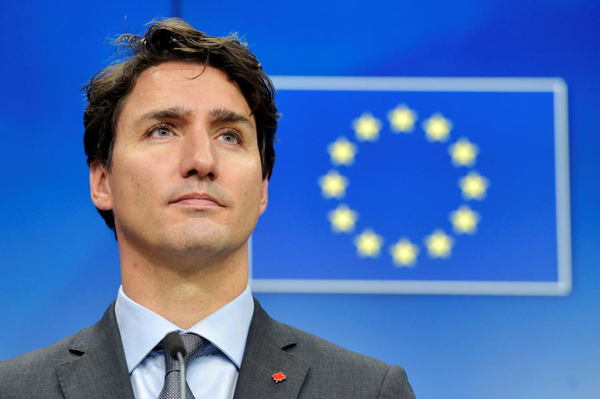EU, Canada sign landmark deals to enhance economic, political partnership
Updated: 2016-10-31 08:52
(Xinhua)
|
|||||||||
BRUSSELS - The European Union (EU) and Canada signed the Comprehensive Economic and Trade Agreement, or CETA, and the Strategic Partnership Agreement (SPA) during a bilateral summit here on Sunday.
|
 |
|
Canada's Prime Minister Justin Trudeau looks on during a news conference after the signing of the Comprehensive Economic and Trade Agreement (CETA) at the European Council in Brussels, Belgium, October 30, 2016. [Photo/Agencies] |
European Council President Donald Tusk, European Commission President Jean-Claude Juncker together with Robert Fico, Prime Minister of Slovakia which is holding the Presidency of the Council of the EU, signed the two landmark deals with Canadian Prime Minister Justin Trudeau at a ceremony held in Brussels.
LONG-DELAYED CETA
The EU-Canada free trade deal was reached in August 2014 after five years of negotiations. However, due to continued oppositions by various groups, including environmental activists, trade unionists and socialists, the final signature of the deal was delayed to this year.
The signing ceremony planned for Thursday was cancelled after a Belgian region opposed to sign the deal. The French-speaking Belgian region of Wallonia concerned that the deal would jeopardize European farmers' interest and grants too much power to multinationals.
The EU, a bloc with 500 million people, can only sign the deal with consent of all member states.
The consensus reached by all regional parliaments of Belgium on approving the CETA Friday cleared the way for signing of the deal.
Hailing CETA as "the most comprehensive, ambitious and progressive trade agreement ever negotiated" by both Canada and the EU, a joint declaration released after the ceremony said the deal would open a new dimension to EU-Canada economic ties.
After signature, the free trade deal still needs to get consent from the European Parliament for it to enter into force provisionally.
The two sides committed to the swift provisional implementation of CETA while ensuring all stakeholders, including employers, trade unions, consumer and environmental groups, participate in the ongoing implementation.
Meanwhile, the deal comes with a binding joint interpretative instrument, which has legal status and will serve as an authentic interpretation of CETA, to explain what the provisions mean in practice.
The landmark deal has sent a "positive signal" about the importance of free, fair and progressive international trade, the joint declaration said.
"Today's decisions demonstrate that the disintegration of the Western community does not need to become a lasting trend," Tusk told a press conference after the ceremony, stressing that the West still possess enough strength and determination to counter fatalism of political's decay.
Tusk said free trade and globalization have protected humanity from poverty, hunger and total conflict, but few people seem to believe or understand this today, noting "Post-factual reality and post-truth politics pose a great challenge on both sides of the Atlantic."
"The alternative to free trade is isolationism and protectionism, a return to national egoisms, and as a result - the threat of violent conflict," he continued, "We should be able to convince our citizens that free trade is in their interest, and not just big companies and corporations."
Juncker also celebrated the signature of the deal. He tweeted in social media after the ceremony, saying "Done. CETA is as of today the new golden standard in trade agreements."
CETA would remove more than 99 percent of tariffs that were currently imposed on trade between the EU and Canada and was expected to increase bilateral trade by 12 billion euros (about $13.2 billion) per year.
The EU estimated that at the end of transitional periods for duty elimination, Canada will eliminate duties worth 500 million euros a year for goods originating in the EU.
ENHANCED SPA
To celebrate the 40th anniversary of the establishment of diplomatic ties, the EU and Canada are also committed to strengthening their cooperation on bilateral and international issues.
The SPA deepens cooperation between the EU and Canada in fields such as foreign policy, crisis management, security and defense, energy and climate, enhanced mobility and people-to-people exchanges, the joint declaration said.
Negotiations for the SPA launched in 2011. Around two-thirds of the agreement will enter into effect on a provisional basis after the signature, while the remaining parts will only enter into effect upon ratification by all EU member states.
A joint declaration issued after the summit said the agreement will "enrich the political dimension of relationship and allow for more cooperation" in various sectors.
Meanwhile, the leaders from the EU and Canada are committed to deepening cooperation between the two sides on foreign policy.
"Today, the people of Canada and the European Union have opened a new chapter in their relationship. More than half a billion people on both sides of the Atlantic will enjoy new opportunities," Juncker told a press conference after the ceremony.
Currently, the EU is Canada's second largest trading partner, with bilateral trade in goods and services amounting to more than 63 billion euros a year. (1 euro = $1.10)
Today's Top News
Email probe takes toll on Hillary's campaign: poll
Strongest quake in decades hits central Italy
EU, Canada sign landmark deals
Party ramps up supervision
Queen Elizabeth visits new town Poundbury
UK retailers catering for homesick Chinese
UK government opts for new Heathrow runway
China's business leaders optimistic about UK
Hot Topics
Lunar probe , China growth forecasts, Emission rules get tougher, China seen through 'colored lens', International board,
Editor's Picks

|

|

|

|

|

|







